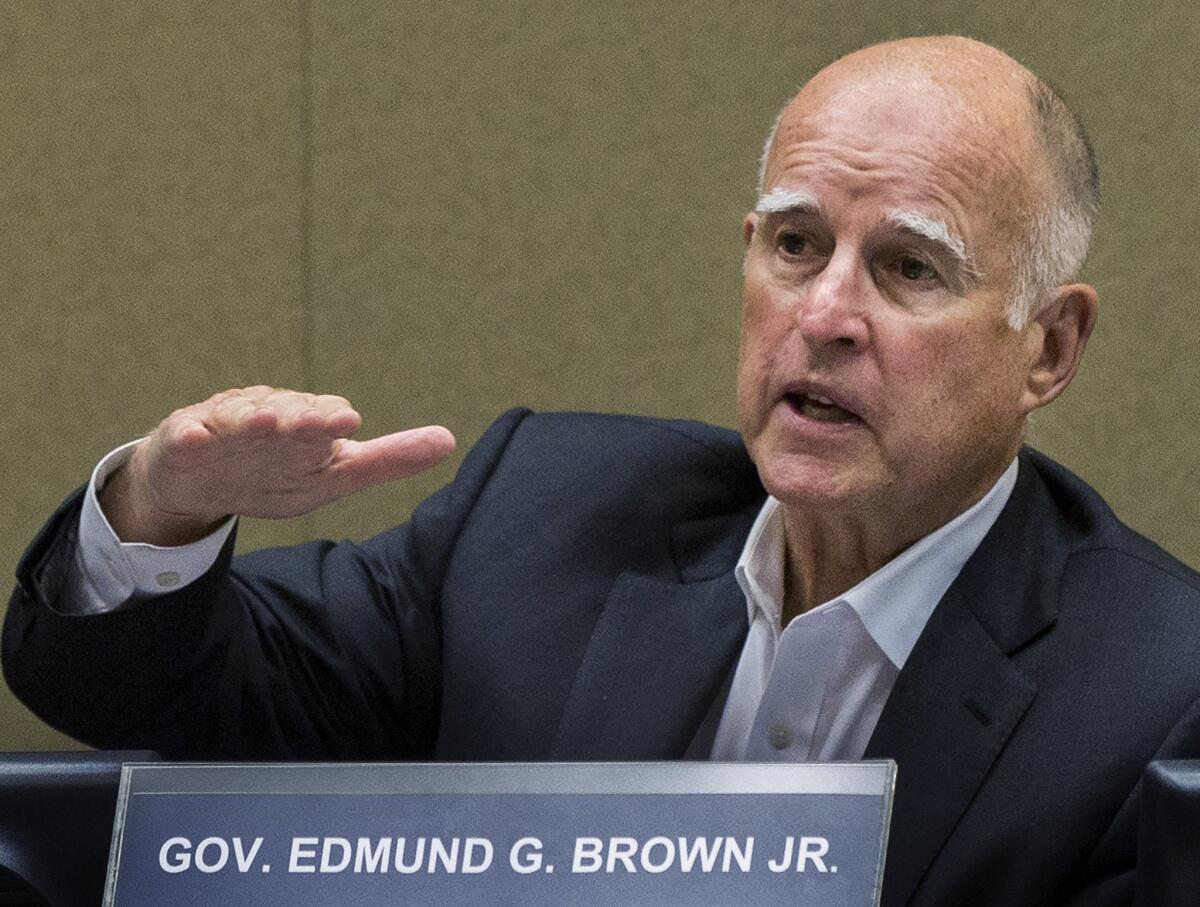Column: ‘Right-to-die’ act hangs in limbo amid special sessions’ inaction

Gov. Jerry Brown signed legislation on Oct. 5 allowing terminally ill patients to legally end their lives using doctor-prescribed drugs.
- Share via
That ballyhooed new California law allowing terminally ill patients to end their suffering by swallowing a lethal pill won’t take effect any time soon. And nobody knows when it will.
Conceivably, it might not be until late next year — or even 2017.
First, the Legislature must adjourn its special session on healthcare financing. Then 90 days later, the “right to die” act can become real.
You probably haven’t been paying much attention to the Legislature’s special session. Don’t feel guilty. Neither has the Legislature.
The lawmakers have pretty much checked out of Sacramento for the year and aren’t scheduled to return until Jan. 4, although they’re still ostensibly convened in two special sessions.
Gov. Jerry Brown called both in June, trying to kick lawmakers into gear on raising more money to fix crumbling highways and creating a new financing scheme for Medi-Cal, the state’s healthcare program for the poor. Neither session is producing anything.
A few lawmakers are trying to grapple with how to raise taxes for road repairs. But the healthcare session is lifeless.
Tell you who probably is paying attention to the healthcare inaction: some terminally ill people and their loved ones. They’re wondering when this façade of a session is ever going to end so they can start making plans for a dignified death.
The law’s effective date is nowhere in sight. It might not be until Nov. 29, 2016 — even March 1, 2017.
Ironically, a legislative procedure that expedited passage of the right-to-die bill wound up delaying its implementation.
Brown called the special sessions to cut corners on passing the highway and healthcare bills. Votes can be taken much quicker than in a regular session.
The governor’s healthcare problem is that the Obama administration has ordered California to stop part of its Medi-Cal financing by July 1. Unless the state finds replacement revenue, there’ll be a $1.1-billion budget hole in the next fiscal year.
Sacramento has been taxing Medi-Cal managed care plans. The feds say the taxing can’t be limited just to Medi-Cal. Brown has proposed also taxing non-Medi-Cal plans. But these plans naturally object. It’s complicated, but this is the sticking point: The Medi-Cal plans get reimbursed for their taxes — half from the state, half from the feds. The non-Medi-Cal plans wouldn’t get any reimbursement.
While the governor, lawmakers and special interests were chewing over that can of worms during the summer, sponsors of the right-to-die bill seized an opportunity. Their proposal was being blocked in the regular-session Assembly Health Committee by Democrats feeling pressure from the Catholic Church.
So sponsors inserted their proposal into the special healthcare session, where the committee had friendlier members. The rest is history.
If the bill had passed in the regular session, it would be taking effect Jan. 1. Now, it’s just a piece of paper floating in limbo.
“From a human perspective, I wish we could shut down this special session immediately,” says Sen. Lois Wolk (D-Davis), one of the bill’s authors. “We could open another.”
But that would require bringing lawmakers back to Sacramento to terminate the session. “People are pretty scattered to the four corners of the planet,” Wolk says.
It’s called junketing.
The predominant thinking — when anyone thinks about it — is that the special session will linger inactive until at least January. Then the lawmakers — Democrats, anyway — might get inspired to act, because the governor will be proposing a new budget that contains deep Medi-Cal cuts to make up for the looming $1.1-billion loss.
Any tax hike would require a two-thirds vote, however, and that means Republican help. But Republicans aren’t likely to be excited about raising taxes to pay for poor people’s healthcare.
Here’s another possible incentive for action in January: By then, a proposed initiative to boost the cigarette tax by $2 a pack may have qualified for the 2016 ballot. If so, that might motivate the influential tobacco lobby to compromise on a reduced tax that could help finance Medi-Cal. At least it’s theoretically possible.
There are bills to tax and regulate tobacco and electronic cigarettes pending in the special session. That’s one reason Democrats are reluctant to adjourn until at least late January.
We claim to be the leader in the country on tobacco control. But we have the lowest tobacco tax of any state surrounding us.
— Sen. Richard Pan
“We claim to be the leader in the country on tobacco control,” says Sen. Richard Pan (D-Sacramento), author of a cigarette tax bill. “But we have the lowest tobacco tax of any state surrounding us.” It’s 87 cents per pack.
If the Legislature were to adjourn the special session on Jan. 31, say, the right-to-die bill still wouldn’t take effect until May 1.
If it waited until the end of the regular session on Aug. 31, the measure wouldn’t be implemented until Nov. 29. And if the Legislature never formally pulled the plug and just went out of business after the November election, the terminally ill would have to wait until March 1, 2017, to begin the process of assisted death.
How many dying patients will suffer pain needlessly while being denied the option promised by Sacramento politicians to end their lives with a physician-prescribed pill?
“Every week counts, every day counts,” Wolk says.
The Legislature should get it gear — or get out of the way.
Twitter: @LATimesSkelton
ALSO
Will California’s end-of-life law push lethal drugs over costlier care?
Gov. Brown still struggling for GOP support on funding for road repairs
Gov. Brown’s link between climate change and wildfires is unsupported, fire experts say
More to Read
Sign up for Essential California
The most important California stories and recommendations in your inbox every morning.
You may occasionally receive promotional content from the Los Angeles Times.











